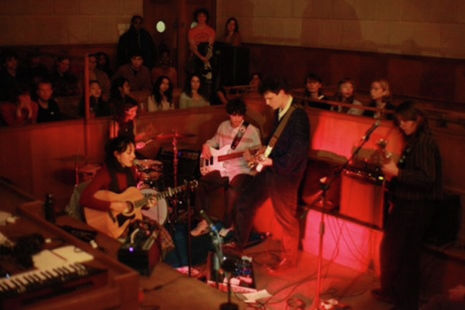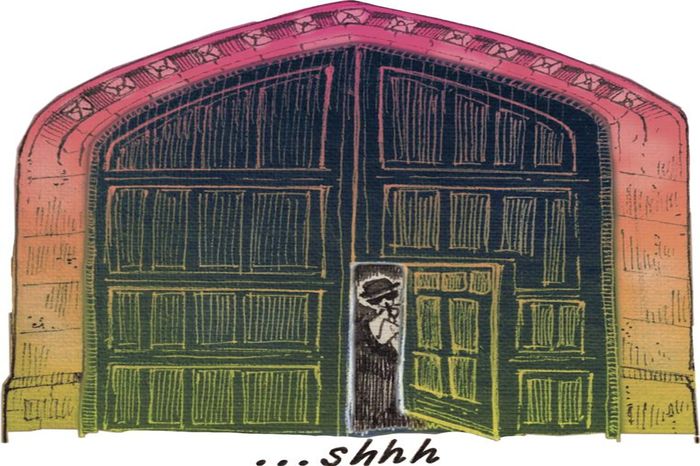The Cantabs combining music and activism in a former courtroom
Sam Elgar speaks to the Sessions Court organisers and performers about music, activism and finding joy in protest

On the south-side of Market Square sits the Cambridge Guildhall. Once a medieval prison, then repurposed to be the seat of the Cambridge Council and a Crown courtroom, the Guildhall is now a community centre and home to Orlene’s Café. A few weeks ago, however, the room that once housed the city’s judicial service was turned into an unconventional music event with an alternative eye and a political edge.
People slowly filled up the seats in the dimly-lit courtroom to watch the menagerie of musical esoterica that was Sessions Court 4. The last event hosted a variety of styles and genres: featuring mostly original music, the performers included a capella singers, lazy synth pianists, and house DJs.
But before the music began, the event’s founder – Umair Ahmad, a former engineering student at Clare College who now lives in London – gave an address about the importance of activism, art, and finding a community. “This is resistance,” he said.
Umair spoke to me about the origins of Sessions Court. “Normal activism – the marches, placards, civil resistance – can be so physically and emotionally draining. I wanted to set up an event where people can express their right to protest in a place of joy.”
"I wanted to set up an event where people can express their right to protest in a place of joy”
Sessions Court is unabashedly political. All the proceeds go to charity, supporting those suffering in Palestine. Sessions 4 was done in collaboration with JAMnesty, a Cambridge organisation that mixes music and activism. The people behind Sessions Court are quick to accept that the hard work of protesting and placarding is necessary; but they insist that alternative methods – art and music – are just as important. “All art is political,” one of the people involved told me. “We wanted to take part in something that contributed to resistance.”
But the event is also about offering a venue for alternative music. Jack Heron, who co-runs Sessions now that Umair has left the university, told me that the event’s ethos is to “platform artists who don’t really get a lot of air time” on the Cambridge scene. Original music and diverse genres make for a kind of gig that isn’t common here, he tells me, and the venue and style make for a more “careful” listening experience, where people aren’t talking while the band is playing. “It’s nice to hear something other than the same four cover bands playing,” Umair said.
Musicians that don’t have a venue available, whose genre or style is not mainstream, or who have not performed before are the target. Umair told me about a busker he saw playing on the street: “he was doing some dreamy shoebox guitar, and I was like, I have to get him on.” David, a homeless musician, performed at Sessions 3 last Lent term. Some of the musicians I saw at Sessions 4 were first-time performers, or performed pieces which would not really work in a normal venue, like a strikingly original blend of spoken-word poetry and a vocal fugue.
"Sessions Court is a great example of how bottom-up events can help effect broader culture and society"
Umair also stressed the importance of supporting local communities. “We spend lots of our time thinking about injustices facing people hundreds of miles away, we often forget about injustices literally on our doorstep.” Sessions is hosted in collaboration with Orlene’s Café, a family-run Jamaican dinery which is run out of the Guildhall. Orlene and her son Leon are respectively owner and chef of the café, and they were heavily involved in the first and subsequent events; the event opened with relaxed jazz in the cafe, before the venue moved to the former courtroom and then to another room for a DJ set.
Above all, however, Sessions Court is a great example of how bottom-up events can help effect broader culture and society. Umair gave me his advice on setting up similar events: “it’s actually way easier than you think. You’ve just got to take the initiative, and often people are way more willing to help than you might expect.” On Umair’s instagram account commemorating Sessions Court 1, there’s a list of some 50-odd people who helped him with the event, from friends to like-minded activists, aspiring musicians to Jamaican-fusion chefs. Jack mentioned that if you are just starting out, it is a good idea to collaborate with an existing organisation to get more boots on the ground.

Beyond the Pitt Club: The Cambridge secret societies you have never heard of
Sessions Court will be continuing with number 5 in Lent term with three or four sets of often-original music in a stunning historical location. Not only is Sessions Court a great example of student activism which tries to support all communities, the project also stands as a testament to the potence of individual action in the face of what may seem overwhelming odds.
 News / Judge Business School advisor resigns over Epstein and Andrew links18 February 2026
News / Judge Business School advisor resigns over Epstein and Andrew links18 February 2026 News / Hundreds of Cambridge academics demand vote on fate of vet course20 February 2026
News / Hundreds of Cambridge academics demand vote on fate of vet course20 February 2026 News / Petition demands University reverse decision on vegan menu20 February 2026
News / Petition demands University reverse decision on vegan menu20 February 2026 News / CUCA members attend Reform rally in London20 February 2026
News / CUCA members attend Reform rally in London20 February 2026 News / Gov grants £36m to Cambridge supercomputer17 February 2026
News / Gov grants £36m to Cambridge supercomputer17 February 2026









